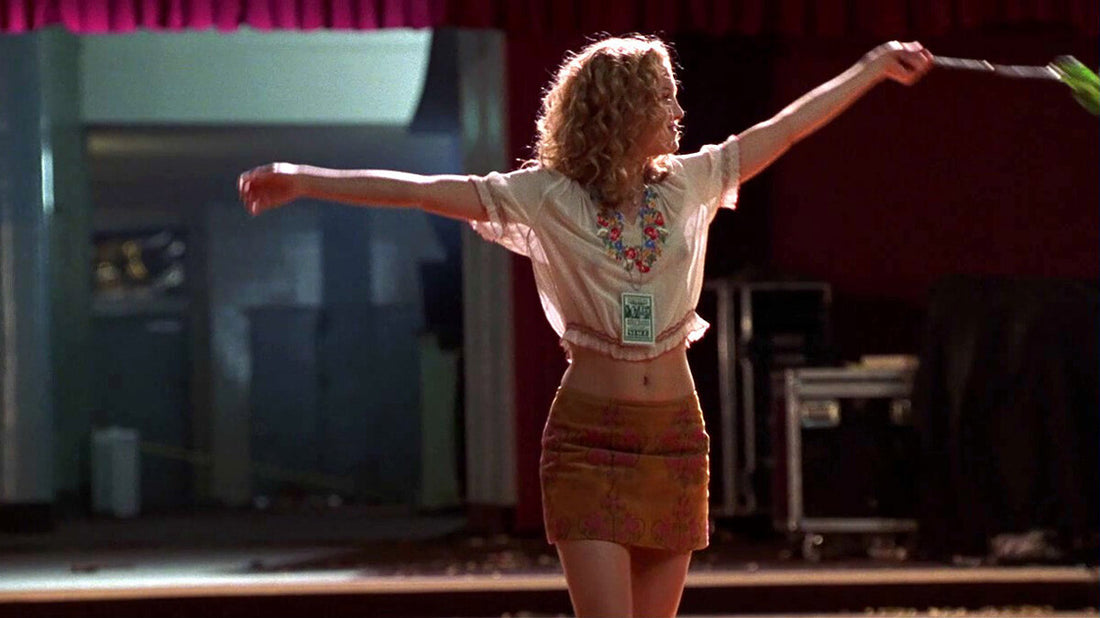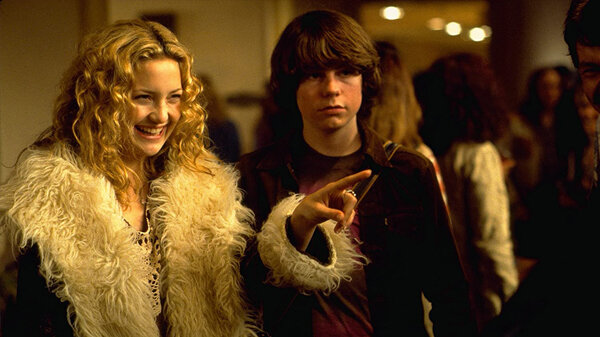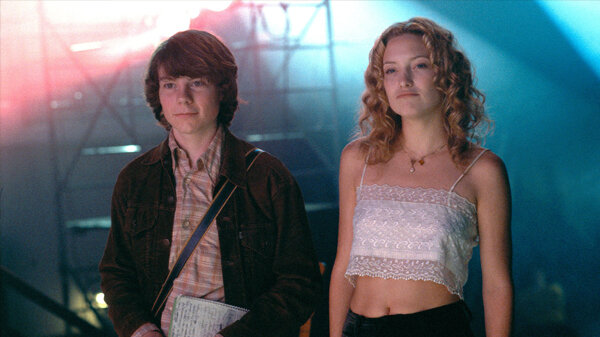The concept of a “Manic Pixie Dream Girl” was coined following a female character written by Cameron Crowe. But in Almost Famous, his film turning 20 this year, Penny Lane gives Kate Hudson the role of a lifetime. Victoria Rodrigues O’Donnell writes on the character’s enduring legacy.
Growing up in the noughties, it felt like Kate Hudson was the lead of every romantic comedy that found its way from silver screens to sleepovers. I recall my mum taking me to the cinema to see Raising Helen, a seminal example of Hudson’s irresistible charm. By that point I was starting to outgrow films starring Hilary Duff or Lindsay Lohan, finding their output increasingly immature, and had long since moved on from the oeuvre of Mary-Kate and Ashley Olsen. Raised on a diet of Friends, but still too young to watch Sex and the City, I could watch Hudson repeatedly play the girl about town I was already aspiring to become.
It is strange, then, to consider that Hudson’s breakthrough role was in Cameron Crowe’s 2000 film Almost Famous. Most certainly not a rom-com in a traditional sense, the film frames a coming-of-age story where William, a 15-year-old aspiring music journalist, comes to befriend the rockstars he idolises, regardless of how often he is appalled by their behaviour. Based on Crowe’s own experiences as a teenage journalist in the 1970s, the film pays a nostalgic ode to touring with the likes of Led Zeppelin, the Eagles and the Allman Brothers Band. Elements of these bands are combined to make Stillwater, the fictional group William goes on the road with.
Patrick Fugit’s central performance as William is innocent and wide-eyed, while the character becomes increasingly frustrated and disillusioned as the film progresses. His mentor, Lester Bangs, had cautioned him not to get too close to the band members, telling him any friendships would be fake. William is reminded that his job is to write what he sees. His mantra is to be “honest and unmerciful,” something easier said than done for the enthralled adolescent. His naivety is brought to the attention of the band late in the film, in a warning made to Stillwater’s guitarist, Russell. During one of her many phone calls, William’s worried mother bemoans, “He worships you people,” before revealing that he’s younger than they all thought.
Hudson plays Penny Lane, the character who captivates William, and the audience, the most. We first meet her in the car park of an arena where Black Sabbath are headlining. She slinks into shot, coming out of the darkness in her trademark fur-collared coat to refute a specific label. “We are not groupies,” she explains. “Groupies sleep with rock stars because they want to be near someone famous. We’re here because of the music. We are Band-Aids… We inspire the bands.” Shortly after, Penny stands by the side of the stage watching Stillwater perform. She gives William a knowing smile. Seconds later, her arms are up in the air as she whoops for the band. Cheering them on is the main reason for her being there.
Penny soon takes William under her wing, as if he is one of the other Band-Aids. The advice she gives to girls encountered on the road could easily be given to William: "Never take it seriously... if you ever get lonely, just go to the record store and visit your friends." One begins to wonder how often Penny herself goes to the record store. While William is swept up by the decadence of hotel lobbies and impromptu parties, Penny has a glint of sadness in her eyes.
In the film’s most poignant scene, she twirls around in an empty concert hall. Barefoot, she spins and slides around in the post-show debris to “The Wind” by Cat Stevens. The scene finishes with an extreme wide shot of her sat forlornly on the ground, with a red rose in her hands. This is the only time we see Penny all alone, forced to reflect on her purpose without a band to inspire or cheer on.
Yet, it is the enduring popularity of this scene which has contributed to the criticism that Penny is a ‘Manic Pixie Dream Girl’. Nathan Fabin coined the term in an essay for AV Club about another of Crowe’s films, Elizabethtown. In reference to Kirsten Dunst’s role as Claire Colburn, Fabin writes: “The Manic Pixie Dream Girl exists solely in the fevered imaginations of sensitive writer-directors, to teach broodingly soulful young men to embrace life and its infinite mysteries and adventures.” In the case of Almost Famous, the accusation is made more complicated by the film’s nature as a memoir in which most, if not all, of the characters are based on real people.
In an interview with the L.A. Times, Crowe defends the portrayal of Penny. “She was never a manic pixie dream girl to me,” the director says. “She’s based on a real person who is definitely not a manic pixie dream girl, in the best way. I always thought she was just a soulful, selfless, loving person who was super into community and kept herself a little bit hidden.”
To dismiss Penny as such a trope is to overlook through whose perspective we see the film unfold. Although the band are suspicious, regularly referring to William as ‘The Enemy’, the young writer is a sincere, innocent teenage boy. Penny is presented as a mysterious, but also trusting, figure. The way she looks out for and counsels William is not unlike his sister, Anita. His crush on Penny is everything one would expect of that age. Unrequited, of course, but also intense and all-consuming. No wonder he accepts her invitation to go to Morocco the first night they met. But, Crowe is careful to show that William is just as passionate and starry-eyed about documenting rock ‘n’ roll and its players. He wants to be truthful in his assignment for Rolling Stone, and is sensitive to how badly the band could come across. William is particularly taken aback when he witnesses Russell trade Penny for $50 and a case of beer in a game of poker. Are these really the men he should be looking up to?
The year following the release of Almost Famous, Hudson won a Golden Globe and received an Oscar nomination for her performance. Snobbery towards rom-coms has meant that the actress has not received accolades like this since. As TV critic Emily Nussbaum put it on her New Yorker essay on Sex and the City, “We fans had trained ourselves to downgrade the show to a ‘guilty pleasure,’ to mock its puns, to get into self-flagellating conversations about those blinkered and blinged-out movies.” With Almost Famous, Crowe gave an access-all-areas glimpse into the vulnerabilities of those on the sidelines. He saw potential in Hudson to bring both defiance and tenderness to what could have been an otherwise two-dimensional supporting role. In the end, Penny walks away from Russell, William and the Band-Aids. She boards a plane to Morocco and with a seat by the window, she looks out onto a new life. One where she finally plays the starring role.
Victoria Rodrigues O'Donnell (@vrodriguesod) is a museum assistant and freelance writer, with work appearing in Art UK, The Quietus, Oh Comely, Orlando, BFR Mag, Ache Magazine and Lecker Zine.



